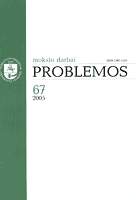GAMTINIŲ BŪTYBIŲ MORALINIŲ TEISIŲ NEANTROPOCENTRINIAI ETINIAI ARGUMENTAI
ARGUMENTS ON NONANTROPOCENTRIC ETHICAL NATURE’S RIGHTS
Author(s): Skaidrė Žičkienė, Jūratė MackevičiūtėSubject(s): Philosophy
Published by: Vilniaus Universiteto Leidykla
Keywords: innate moral rights; utilitarianistic trend; deontological trend; T. Regan; P. Singer
Summary/Abstract: In this article the authors explore preconditions of nonantropocentric ethical nature’s rights. In the 17th century J. Locke proposed a concept of innate rights, maintaining that every man has innate rights to life, freedom, health, striving for happiness. These rights are different from legal rights, which have legal and moral basis recognized by everybody. However, according to Locke, nature has no innate moral rights. Three centuries later, this theory was expanded to nature and its objects, both animate and inanimate by applying the category of innate moral rights. This was performed by Western ecophilosophers, when they were developing theory and practice of protecting the environment. Nowadays the ecological ethics presents two possible proofs of animals’ innate (moral) rights: utilitarianistic and deontological. According to P. Singer, the main representative of the utilitarianistic trend, every live being deserves attention not because of its reason, but because of its ability to feel. The views of T. Regan, the most prominent representative of the deontological trend, are far more radical, as he demands not to reform human’s behaviour towards nature but to end the existence of animal farms and to forbid both commercial and sports hunting. In the context of ecological ethics, protectors of animals’ rights define their trend as the whole of ideas about moral and legal human’s behaviour towards animals.
Journal: Problemos
- Issue Year: 2005
- Issue No: 68
- Page Range: 128-134
- Page Count: 7
- Language: Lithuanian

